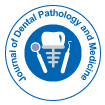Nuestro grupo organiza más de 3000 Series de conferencias Eventos cada año en EE. UU., Europa y América. Asia con el apoyo de 1.000 sociedades científicas más y publica más de 700 Acceso abierto Revistas que contienen más de 50.000 personalidades eminentes, científicos de renombre como miembros del consejo editorial.
Revistas de acceso abierto que ganan más lectores y citas
700 revistas y 15 000 000 de lectores Cada revista obtiene más de 25 000 lectores
Indexado en
- Google Académico
- ICMJE
Enlaces útiles
Revistas de acceso abierto
Comparte esta página
Abstracto
Oral Inflammatory Diseases Impact on Atrial Fibrillation: A Comprehensive Review
Patricia Tang
Atrial fibrillation (AF) is a prevalent cardiac arrhythmia associated with a heightened risk of severe cardiovascular complications. While traditional risk factors have been well-established, there is growing evidence to suggest that oral inflammatory diseases may contribute significantly to AF development and progression. This comprehensive review explores the intricate connection between oral inflammatory diseases and AF, highlighting potential mechanisms and clinical implications.
The oral cavity hosts a diverse microbiome and inflammatory conditions such as periodontal disease and gingivitis, among others. These conditions can release pro-inflammatory mediators, bacterial toxins, and elicit immune responses that may affect remote organs and systems, including the cardiovascular system.
Inflammation, a recognized player in cardiovascular diseases, is believed to contribute to AF by promoting atrial inflammation and fibrosis, affecting the myocardium and conduction system, ultimately leading to electrical and structural remodeling. Potential mechanisms encompass the release of inflammatory mediators, endothelial dysfunction, microbiota dysbiosis, and autonomic nervous system activation.
Recognizing the interplay between oral health and AF holds clinical significance. Collaboration between dentists and cardiologists for at-risk patient identification and integrated care plans is crucial. For AF patients, maintaining good oral health may serve as an adjunctive strategy to reduce the risk of AF recurrence and associated complications.
In conclusion, the association between oral inflammatory diseases and AF represents a promising avenue for understanding the multifactorial nature of this cardiac arrhythmia. While further research is required to establish causality and precise mechanisms, the evidence suggests that oral health is not merely confined to dental care but extends to cardiovascular well-being. Acknowledging this intricate relationship between oral and cardiac health paves the way for more holistic patient care and novel approaches to AF prevention and management. Additional studies are needed to validate the clinical utility of addressing oral inflammatory diseases in AF prevention and treatment strategies.
Revistas por tema
- Agricultura y acuicultura
- Alimentación y Nutrición
- Bioinformática y biología de sistemas
- Bioquímica
- Ciencia de los Materiales
- Ciencia general
- Ciencias Ambientales
- Ciencias Clínicas
- Ciencias farmacéuticas
- Ciencias Médicas
- Ciencias Sociales y Políticas
- Ciencias Veterinarias
- Enfermería y atención sanitaria
- Física
- Genética y biología molecular
- Geología y Ciencias de la Tierra
- Ingeniería
- Inmunología y Microbiología
- Química
Revistas clínicas y médicas
- Anestesiología
- Biología Molecular
- Cardiología
- Cirugía
- Cuidado de la salud
- Dermatología
- Diabetes y Endocrinología
- Enfermedades infecciosas
- Enfermería
- Gastroenterología
- Genética
- Inmunología
- Investigación clínica
- Medicamento
- Microbiología
- Neurología
- Odontología
- Oftalmología
- Oncología
- Pediatría
- Toxicología

 English
English  Chinese
Chinese  Russian
Russian  German
German  French
French  Japanese
Japanese  Portuguese
Portuguese  Hindi
Hindi